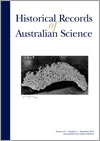
Historical Records of Australian Science
Scope & Guideline
Connecting Past Innovations to Future Insights.
Introduction
Aims and Scopes
- Biographical Studies of Scientists:
The journal publishes extensive biographical accounts of notable Australian scientists, detailing their contributions, methodologies, and impacts on their respective fields. - Historical Analysis of Scientific Discoveries:
It explores the historical context of significant scientific discoveries and developments in Australia, providing insights into the processes and challenges faced by scientists. - Interdisciplinary Approaches to Science History:
The journal encourages interdisciplinary research that connects various scientific disciplines and their historical narratives, fostering a more integrated understanding of science in Australia. - Focus on Plant Pathology and Agriculture:
A notable emphasis is placed on plant pathology and agricultural science, highlighting the contributions and challenges faced in these fields throughout Australian history. - Documentation of Scientific Institutions:
The journal also covers the history of scientific institutions in Australia, documenting their evolution, influence, and the scientists associated with them.
Trending and Emerging
- Plant Pathology and Agricultural Science:
There is a significant increase in publications related to plant pathology and its historical significance in agriculture, reflecting heightened interest in food security and disease management. - Biographical Accounts of Underrepresented Scientists:
The journal has begun to emphasize the contributions of underrepresented groups in science, particularly women and Indigenous scientists, revealing a commitment to inclusivity in the historical narrative. - Environmental History:
Emerging themes in environmental history are becoming more prominent, as researchers explore the intersection of science, ecology, and the impacts of climate change on Australian landscapes. - Public Health and Epidemics:
There is a rising trend in historical analyses of public health crises and epidemics, particularly in light of recent global health challenges, showcasing the relevance of historical perspectives in contemporary discussions. - Interdisciplinary Collaborations:
The journal is increasingly featuring interdisciplinary studies that combine history with other fields such as sociology, anthropology, and environmental studies, reflecting a holistic approach to understanding science history.
Declining or Waning
- General Science Histories:
There has been a noticeable decrease in broad overviews of scientific history in Australia, with a shift towards more focused studies on specific individuals or diseases. - Non-plant Related Biological Sciences:
The journal seems to be publishing fewer articles related to general biological sciences that do not pertain to plant pathology, indicating a narrowing of focus. - Historical Narratives of Engineering and Technology:
Topics related to the history of engineering and technology in Australia have become less frequent, suggesting a potential shift away from these subjects in favor of biological sciences. - International Comparisons in Science History:
Comparative studies of Australian science with other countries are less common, indicating a trend towards a more insular focus on local contributions. - Cultural and Social Contexts of Science:
The exploration of the cultural and social contexts surrounding scientific developments in Australia appears to be waning, with less emphasis on these interdisciplinary connections.
Similar Journals
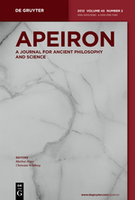
Apeiron-A Journal for Ancient Philosophy and Science
Uncovering the Intersections of Past and Present KnowledgeApeiron - A Journal for Ancient Philosophy and Science is a distinguished academic journal published by Walter de Gruyter GmbH, based in Berlin, Germany. As an essential platform for scholars in the fields of History and Philosophy of Science and Philosophy, this journal holds a prestigious Q1 ranking in both domains as of 2023, reflecting its significant impact and contribution to these disciplines. With its ISSN 0003-6390 and E-ISSN 2156-7093, Apeiron aims to foster interdisciplinary dialogue by publishing original research, reviews, and critical essays that explore the rich intersections of ancient thought and scientific inquiry. As the journal converges into its fifth year from 2019 to 2024, it offers a vital resource for researchers, professionals, and students seeking to deepen their understanding of classical philosophical traditions and their relevance to contemporary science. Although it operates under a subscription model, the rigorous peer-review process ensures that each publication maintains the highest academic standards, thus solidifying Apeiron's status as a pivotal resource in its field.

Natural Sciences
Bridging disciplines to illuminate the wonders of the natural world.Natural Sciences is a premier journal published by WILEY, dedicated to advancing the interdisciplinary field of natural sciences through the dissemination of high-quality research. With an ISSN of 2698-6248, this publication features original contributions that explore a wide range of topics including biology, chemistry, physics, and environmental science. Despite the current absence of an impact factor, the journal's commitment to rigorous peer-review ensures the integrity and relevance of its scholarly work. Situated at the forefront of scientific inquiry, Natural Sciences serves as a vital resource for researchers, professionals, and students looking to stay informed about the latest breakthroughs and methodologies in the natural sciences. Emphasizing open access principles, this journal strives to make cutting-edge research readily available to a global audience, fostering collaboration and innovation across disciplines.
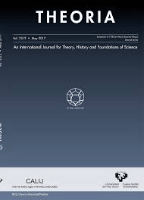
THEORIA-REVISTA DE TEORIA HISTORIA Y FUNDAMENTOS DE LA CIENCIA
Connecting Disciplines Through Scholarly ExcellenceTHEORIA-REVISTA DE TEORIA HISTORIA Y FUNDAMENTOS DE LA CIENCIA, published by the Servicio Editorial Universidad del País Vasco, is a leading open access journal dedicated to advancing the fields of History, Philosophy of Science, and related disciplines since its inception in 2003. With a robust impact factor placing it in the esteemed Q1 and Q2 quartiles in its respective categories, this journal serves as a crucial platform for researchers, professionals, and students who are engaged in profound discussions and analyses of scientific foundations and historical contexts. Based in Spain, THEORIA has consistently demonstrated its commitment to scholarly excellence, achieving notable rankings in Scopus, particularly in the fields of Arts and Humanities, where it holds a rank of #169 in Philosophy and #59 in History and Philosophy of Science. The journal not only allows immediate open access to its diverse range of articles, fostering global knowledge dissemination, but also aims to bridge connections across varied philosophical inquiries and historical explorations within science. Join the dialogue today in shaping the future understanding of our scientific heritage.
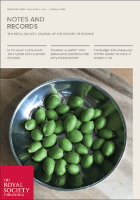
Notes and Records-The Royal Society Journal of the History of Science
Uncovering the Past, Shaping the Future of ScienceNotes and Records - The Royal Society Journal of the History of Science is an esteemed scholarly journal published by the Royal Society in the United Kingdom, focusing on the historical aspects of science and its impact on modern scientific practices. With an ISSN of 0035-9149 and E-ISSN 1743-0178, this journal serves as a vital platform for researchers, professionals, and students who seek to explore the intricate connections between historical developments and contemporary scientific discourse. Recognized for its academic rigor, it holds a commendable position in the Q3 category of the History and Philosophy of Science field, ranking #56 out of 223 according to Scopus, and showcasing a 75th percentile ranking. Covering converged years from 1970 to 1973 and from 1975 to 2024, the journal publishes articles that contribute significantly to the understanding of the evolution of scientific thought. While it currently does not operate under an open access model, its esteemed content continues to engage a broad readership, fostering a deeper appreciation for the history behind scientific innovation and inquiry.

HISTORY OF SCIENCE
Documenting the Evolution of Ideas that Changed the WorldHISTORY OF SCIENCE, published by SAGE PUBLICATIONS LTD, stands as a pivotal journal in the domain of historical studies, with a focus on the development and evolution of scientific thought and practice throughout history. With an ISSN of 0073-2753 and an E-ISSN of 1753-8564, this journal is recognized for its commitment to high-quality research, as evidenced by its categorization in the Q2 quartile for History and Q3 for History and Philosophy of Science in 2023. Spanning a converged history from 1962 to 2024, the journal serves as an essential platform for scholars, providing in-depth analyses and discussions that foster a deeper understanding of the interplay between science and its historical context. As a well-regarded source in the field, it ranks #140 out of 1760 in Arts and Humanities History and maintains a commendable 92nd percentile ranking, highlighting its influence and reach among researchers and professionals alike. Although not an Open Access journal, it remains accessible to students, scholars, and practitioners in the field, bridging the past and present of scientific inquiry.
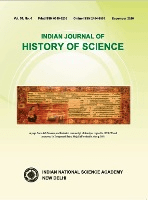
INDIAN JOURNAL OF HISTORY OF SCIENCE
Exploring the Rich Tapestry of India's Scientific LegacyINDIAN JOURNAL OF HISTORY OF SCIENCE, published by the Indian National Science Academy, offers a vital platform for researchers, professionals, and students dedicated to the exploration of the historical development of science and technology in India and beyond. With the ISSN 0019-5235 and E-ISSN 2454-9991, this peer-reviewed journal aims to promote interdisciplinary collaboration by publishing original research articles, reviews, and discussion papers that highlight the contributions and evolution of scientific thought throughout history. The journal fosters a unique understanding of how historical contexts have shaped current scientific paradigms, making it an essential resource for academic inquiry. Although it does not currently offer Open Access options, the journal's rigorous editorial standards ensure that it maintains a significant impact within the scholarly community, serving as a crucial reference point for historical scholarship in the sciences. Its address in Bahadur Shah Zafar Marg, New Delhi 110 002, India, situates it within a rich tapestry of cultural and academic heritage, further enhancing its significance in the field.

Metode Science Studies Journal
Cultivating Scholarly Exchange in Multidisciplinary ResearchMetode Science Studies Journal, published by UNIV VALENCIA, BOTANICAL GARDEN UV, is an esteemed open-access journal dedicated to advancing scholarly discourse in the fields of history and philosophy of science and multidisciplinary studies. Since its inception in 2013, the journal has positioned itself as a vital resource for researchers, professionals, and students, fostering an environment for innovative research and cross-disciplinary dialogue. Based in the vibrant city of Valencia, Spain, this journal aims to publish high-quality articles that explore the intricate relationships between scientific practices and philosophical inquiries. With a current impact factor demonstrating its relevance in the academic community, the journal is indexed in Scopus, ranking in the 52nd percentile for history and philosophy of science and the 33rd percentile for multidisciplinary studies. Scholars can access a breadth of research outputs that span from 2015 to 2024, thereby contributing significantly to the intellectual landscape of the respective fields.
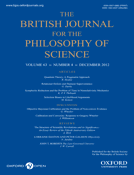
BRITISH JOURNAL FOR THE PHILOSOPHY OF SCIENCE
Navigating the Complexities of Science Through PhilosophyThe British Journal for the Philosophy of Science, published by University of Chicago Press, stands as a leading journal in the fields of philosophy and history of science. With its ISSN 0007-0882 and E-ISSN 1464-3537, this esteemed publication has been pivotal in advancing philosophical discussions surrounding scientific practice since its inception in 1950. Covering a diverse range of topics and critical analyses, it holds an impressive track record within the academic community, consistently achieving Q1 rankings across several categories, including History, Philosophy, and History and Philosophy of Science. With a Scopus rank placing it in the top percentiles of its respective fields, the journal is recognized not only for its academic rigor but also for its role in shaping contemporary philosophical discourse. While it is not an open-access journal, the British Journal for the Philosophy of Science provides essential insights and fosters critical thinking, making it an indispensable resource for researchers, professionals, and students dedicated to the nuanced interplay between science and philosophy.

Spontaneous Generations-Journal for the History and Philosophy of Science
Connecting Generations of Thought in Science and PhilosophySpontaneous Generations: Journal for the History and Philosophy of Science is a dedicated publication focusing on the rich fields of history and philosophy within the scientific domain. Published by the Institute for the History and Philosophy of Science and Technology, this journal provides a vital platform for scholars, researchers, and students to explore and disseminate ideas that bridge the historical context and philosophical inquiries of scientific practices. With its commitment to open access, Spontaneous Generations ensures that groundbreaking research is widely available, fostering an environment of collaboration and knowledge sharing. Aiming to engage a diverse audience, this journal is pivotal for those looking to understand the evolution of scientific thought and its implications on contemporary issues, making it an essential resource in the academic community.

Foundations of Science
Unraveling the Threads of Science's HistoryFoundations of Science is a renowned academic journal published by SPRINGER, dedicated to the interdisciplinary exploration of both the historical and philosophical dimensions of science. Established in 1995 and based in the Netherlands, this journal has carved out a significant niche within the History and Philosophy of Science and Multidisciplinary fields, holding an impressive Q2 ranking in both categories as of 2023. The journal's rigorous peer-review process ensures the dissemination of high-quality research, supported by its Scopus rankings, which place it in the top 15% of its peer group in History and Philosophy of Science and the top 28% in Multidisciplinary studies. Although not an open-access journal, Foundations of Science remains accessible through various academic channels, making its vital contributions to the discourse surrounding scientific foundations available to a broad audience. By fostering dialogue across disciplines, it plays a crucial role in advancing the understanding of science's philosophical underpinnings and its historical development, making it an essential resource for researchers, professionals, and students alike.